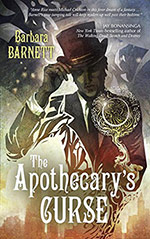
![]() Nymeria
Nymeria
11/17/2016
![]()
When I saw this title in the list of the books offered for review I was immediately intrigued, since the story promised to combine old myths and modern conspiracies in what looked like an irresistible mix. Gaelan Erceldoune is an apothecary in mid-nineteenth century London, a man harboring a secret that goes back to more ancient times. When he is approached by Dr. Simon Bell, a man desperate to save his beloved wife Sophie from cancer, he concocts a substance that could cure her, provided his client follows instructions to the letter. Sadly, Sophie dies anyway and Simon, in a fit of desperation, drinks the rest of the elixir to follow her into death, but only manages to make himself immortal, just like Gaelan who drank a similar potion to cure himself from the plague two centuries earlier.
From that moment on, the destiny of both men becomes inextricably linked: as Simon tries in vain to kill himself, not realizing yet the change effected by the potion, Gaelan becomes the victim of a deranged scientist who submits him to terrible tortures for years in the hope of finding the secret of his rapid healing and immortality. When the two reunite again they will need to pool their resources to find the key to their condition in a mysterious book of ancient remedies that was Gaelan's family heirloom and that disappeared after his incarceration. Gaelan hungers for the old wisdom contained in the book, the only link that remains to his long-lost family, and Simon only seeks the way to reverse the procedure and finally join his beloved Sophie in death.
The story unfolds on two tracks--the events from mid-nineteenth century London and those from the present day--that intertwine around each other not unlike DNA strands, an image that recurs often in the course of the novel. This narrative style makes for a quick, fascinating read, even more so for the past, as we follow Gaelan's soul-wrenching experiences at the hands of doctor Hailey and his cronies, who could give the infamous Mengele some points. In the present, the danger comes from the research of an unscrupulous pharmaceutical company that has gotten wind of Gaelan's existence and tries to hunt him down for the obvious advantages that could derive from the study of such a unique individual.
I did enjoy the story overall, though I felt more partial to the half of it set in the past: to me it held the attraction of a period piece interlaced with some mystery and a few touches of ancient magic, and I loved the peek it allowed into the times' mores and thought processes, even though the language sounded a little too flowery for my tastes.
The present-times section had a more... unfinished flavor for me, and it contrasted starkly with its twin half: if I wanted to put my feelings into images, I could say that the nineteenth century sections were in full color, while the twenty-first century ones seemed somewhat faded and less real than their counterparts. After a while I found myself thinking that the author must have felt this way as well, and needed to anchor the writing for the present times to some firm points: I believe this must have been the reason for the liberal (and in my opinion often unwarranted) use of the f** word or the brand names of the various articles of clothing, drinks or electronic equipment mentioned in the course of the story, that always felt to me like pasted-on additions that somehow did not truly belong in there.
That said, The Apothecary's Curse is a swift, interesting read that will appeal to the estimators of the genre.
http://spaceandsorcery.wordpress.com